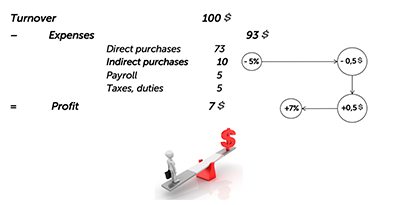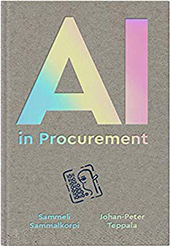I have long wanted to write an article about the Russian specifics of the terms of "procurement" and "purchasing" and how procurement in companies is organized differently.
But there were more topical questions: “What the difference between commercial Procurement at one side and Sales or Buy-Sell at another side?”, “What is the difference between professional Procurement and regular Buying at a retail store?”. "What associations arise when you hear the word" Procurement"?".
If you are a professional buyer then you will probably be surprised by these issues, however, the fact that these issues exist among Russian entrepreneurs. So
Why Procurement Is Not Sales
At two days before I participated in a case session entitled “Procurement for business. Manual for use" in the framework of the event "pro management ". And (oh, surprise!), I was the only speaker with a story on Procurement and how to make them effective for business. The remaining 7 speakers spoke on the topic of participation in the state procurement and what Sellers must do to sell their products or services to the state. Dialogue of one of the speakers with a participant from the audience:
Participant: - Colleagues, I do not want to listen to your discussion on how to participate in the state ordering ...
Speaker: - Meme, you are saying the wrong thing, the term of "state order” no longer exists!
Participant: - Whatever, let's talk about commercial procurement.
Moderator: - But, what is your question?
Participant: - Theme "manual for BUSINESS ..": what are the levers of procurement management? Tell us about your experience.
Moderator: - Ahhh, everything is clear, then let's discuss what you mean by the word “procurement”!
(Judging by the further dialogue, the participant begins to doubt the adequacy of speakers):
Participant: - Do you work for a company? You have income, you have expense and profit, right?
Speaker: - Yes
Participant: - accordingly, you spend money on the purchase of materials and services for your own needs to create your commercial product, right?
(Speaker's look with bulging eyes)
Moderator: - Meme, it may be worth listening to the end, and you will receive an answer to your question. It will be about business for you.
Speaker: - Commercial procurement, say .. Once we participated in a tender of a large commercial company .... Meme, where are you leaving?!
Participant: - Guys, thank you, but you are not buyers, you are sellers. Not interested.
I did not hear a more absurd dialogue at a professional business session about procurement for business.
Checking Google’s response to the word “procurement” at Russian::
- The first two resources in the search are state portals. Federal and Moscow procurement, respectively: zakupki.gov.ru and zakupki.mos.ru;
- Next is a long list of various state, departmental sites and state. corporations;
- And only at the 43rd search position does the first service for buyers appear: SAP Ariba.
The English-language query “procurement” gives 100% results in the field of procurement.
It turns out that in Russia the term of “Procurement” is associated primarily with services for the sale to the state. It is understandable: the “state” is the main "buyer" in Russia, the volume of “state. procurement ”in 2018 amounted to 24.2 trillion. rub. by the volume of concluded contracts (of which 7.5 trillion rubles - non-public trading and 16.7 trillion rubles passed through the EIS system) or 23.4% of GDP. For comparison, state at the EU purchases 13.4%, Japan 16.2% and 9.3% of GDP in US.
The second reason is that the business focuses on sales growth and does not see the potential in cost management, which, with a competent approach and constant sales, can have a huge positive effect on profit. At the same case session, I asked the question: “here you are the manufacturer, and how do you purchase raw materials, components, equipment, supplies and services”, the answer shocked me: “we are buying everything on Yandex Market”. Neither analysis nor negotiations with suppliers. But we can talk about the cost of billions, or hundreds of millions of rubles.

Professional procurement, for example, in a low-margin business, gives the effect of leverage, that is, an increase in profit by a larger percentage than% of the savings received.
Marketplace is a retail site, they can be used to search for potential suppliers, but nothing more.
And the fact that cost reduction “kills” quality is a stereotype that I have repeatedly refuted in practice. Want to know how? Write to me Info@VGProcurement.ru and I will be happy to answer you.
In an intensely growing economy until 2014, Sales were the main driver of company development. But now growth has slowed, retail trade in 2018 has grown by less than 2% in real terms and in the future 5-7 years of high growth in sales will no longer be. So now is the time to ask yourself questions:
- What could be a business development strategy under these conditions?
- What is the payback on investment and efforts into the Sales?
- What could be an alternative?
The time of crisis and recession is a time of increased competition and a time of other opportunities. Principle Profit = Revenue - Expenses works with mathematical precision. And if a business refers to expenses on the principle of “buy on Yandex,” then such a business has little chance of surviving and developing in the competition. But as Edward Deming said:
It is not necessary to change,
survival is not mandatory
, and each company makes its choice.
You invest a lot in your sales. Suppliers from whom your company buys raw materials, other materials and services also invest a lot in their sales. And what do you invest in your procurement? What is the competency level of your buyers? What rules do they follow? What tools do they use?
Why Procurement Is Not Shopping
The difference between professional procurement and regular shopping is that in the first case you have much more opportunities to get better conditions and, as a rule, a more advantageous position. It remains only to learn how to use it!
If you begin to engage in procurement professionally, then as a first approximation, you can almost always get a 10-15% reduction in the total cost of ownership (TCO) of the procurement item relative to the initial offer. The margin of your suppliers is 20-40% or more, with rare exceptions (car dealers, etc.) whose margins are less than 10%.
There are conditions and situations when the business does not use this - it is micro-purchases on which the resources for the procurement are not commensurate with the performance. For example, the consumption of stationery of your company does not exceed 200,000 rubles per year, then it makes no sense to spend efforts to get an effect of 20,000 rubles. Analyze your perimeter on the principle of 20/80, set the boundary and rules for yourself and do not waste time on “procurement's tails”. It all starts with a procurement strategy.
The solution exists!
Procurement is a profession. In Europe and the USA this is taught in high school and colleges. There are professional training institutes. There is no such practice in Russia.
If in Russia in the business environment, purchases are associated only with “state procurement ”(ie, sales to the state) or with purchases in the marketplace, the world is now actively introducing the use of analytics systems in procurement based on Artificial Intelligence (for example, companies Sievo)and publish books on this topic (I recommend, there is on Amazon).

When I read articles by European experts with the words: “Gone are the days when purchases were responsible only for cost reduction ...”, I want to shout that in many Russian companies such times have not come yet! Our lag behind the West in the development of the Procurement area is about 10-15 years. The situation is better in foreign companies operating in the Russian market: purchases are being integrated with headquarters, the company is ready to invest in training its buyers in European schools.
When we meet a “buyer” (and, in fact, just a person with no professional training, who was assigned to make or to manage of procurement), who claims that:
- its bad boss demands to transfer the supplier from 100% prepayment to at least 50% -50% conditions, and this is terribly unfair to the supplier who needs to be protected ...;
- requiring the buyer to disclose his correspondence with the supplier is not ethical and it is an “insult by mistrust”;
- make basic purchases at retail sites, it is effective;
- the task of procurement saving inevitably leads to a decrease in quality;
- deferred payment leads to higher costs;
- the buyer cannot manage consumption, specification, costs;
- and so on ...
on the one hand, it causes a feeling of abyss, but on the other, a great desire to make a difference.
Dear colleagues and their leaders, let's learn and develop. It seems to me that Russia does not deserve to lag behind the tail of world civilization. I announce the Elimination of Illiteracy in Pprocurement!
Together with my partner Elena Vyshlova we created the Russian procurement school V&G Procurement, so that, using our many years of experience of business practitioners, to share with companies easy-to-understand, but specific work tools and solutions that will help to achieve a significant economic effect in procurement and integrate it into the business result of the company. We are supported by our friend and partner, a person with vast international procurement experience - Pierre-Michel Guyomard. The school is based on the best European procurement practices that have been tested for many years in the Russian market. In addition, we are the owners of the author's concept of procurement in business analytics. This is the concept of data-driven procurement — building a procurement strategy based on large analytic data. The future is data driven, because
The world's most valuable resource
is no longer oil, but data.
The Economist, 2017
We will present this concept in detail at the Congress of Professional Buyers 2020 this year, November 21-22. In addition, we are implementing these models together with companies that are already seeing the possibility of gaining a competitive advantage in effective cost management.
For us, this is not just a commercial project, it is a method for changing the business environment in Russia, it is the development of the profession and culture of procurement, improving business efficiency, ethics in procurement, all this is embodied in our slogan:
we are changing your look at procurement ™
